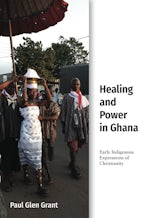Scholarship on encounters between Western Christians and African peoples and their cosmologies continues to be lopsided, privileging missionary perspectives. Paul Grant has decisively corrected that imbalance, showing how from the mid-1830s the people of Akuapem in modern Ghana incorporated the Basel missionaries and their message within their own world of ritual power and communal healing. In so doing, Grant achieves two highly significant goals. He shows that the story of what we now label as African 'Pentecostalism' begins much earlier than is conventionally imagined; and by ranking missionaries among the Akan ancestors he skillfully transcends the barren academic debate between advocates of the externality or indigeneity of African Pentecostalism.
~Brian Stanley, Professor of World Christianity, University of Edinburgh
In Healing and Power in Ghana, Paul Grant returns to the period preceding the rise of African Christian independency to interrogate processes of indigenous reformulation of the gospel in order for it to respond to local religious sensibilities. We have here a groundbreaking volume that enables an appreciation of how indigenous Christians of the Gold Coast recalibrated faith. Through the performative aesthetics of lived religion, they anticipated the rise of independent indigenous Pentecostalism. This is a truly remarkable piece!
~J. Kwabena Asamoah-Gyadu, PhD, Baëta-Grau Professor of African Christianity and Pentecostalism and President, Trinity Theological Seminary, Legon, Ghana
Healing and Power in Ghana is a fine piece of in-depth historical writing of wider relevance than its title may suggest. Dr. Grant carefully unpacks the concerns, understandings, and interactions of German missionaries, British colonial officials, and the various peoples of the Akuapem Ridge during a formative period for Ghanaian Christianity. The Bible in its Twi translation is revealed as a significant actor in the story.
~Andrew F. Walls, University of Edinburgh, Liverpool Hope University, and Akrofi-Christaller Institute, Ghana
In this well-researched and accessibly written book, Paul Glen Grant echoes perhaps what indigenous African Christians have always intuited: African Christianity rising, even in its fastest growing wing, is not a twenty-first or even a twentieth-century phenomenon.
~Esther E. Acolatse, Church History
…A great book that should be read widely by scholars of global Christianity, African Christianity, mission studies, West African history, and religion more broadly
~Adam H. Mohr, H-Net Reviews
…Paul Glen Grant succeeds in bringing alive his central argument with rich ethnographic insights. The overall narrative of the book is presented from a cross-historical lens which proves a clearer prism through which to see early indigenous religious expression as a precursor of present-day Ghanaian Pentecostalism. This book will appeal to students of comparative religions and African church historiography.
~Isidore Lobnibe, Journal of Ecclesiastical History
Grant’s excellent exposition is highly recommended as a source for scholars and students of the history of Christianity, cross-cultural studies, comparative religion, sociocultural and general studies on Africa.
~Ebenezer Ayesu, Missio Dei
Overall, the study is smart and sensitive. The prose is exceptionally clear and a pleasure to read. Without a doubt, this book is required reading for any student interested not only in missionary activities in Africa, but also in landscapes of power, shrines, and the spiritual dimensions of imperial confrontations.
~Sarah Balakrishnan, African Studies Review
Drawing richly from archival sources, Paul Grant presents a masterpiece describing the place of Christianity in Ghana’s early formation. He skillfully presents the culture and faith of nineteenth-century Ghana.
~Francis Benyah, International Bulletin of Mission Research
In this well-written, historically rich, and detailed monograph, Grant sets out to understand the making of Ghanaian Christianity by exploring how indigenous intellectual and cosmological frameworks, as well as pragmatic concerns and experiences, came to shape the reception and domestication of missionary Christianity.
~Karen Lauterbach, Reading Religion
It embodies what the whole book documents in detail: that in the years before the English colonizaiton it was the Africans who, in search of healing, belonging, and spiritual powers, created a new, unique form of Christianity, combining it with their religious forms and used the missionaries for this very purpose.
~Martin Hailer Heidelberg, Theologische Literaturzeitung

